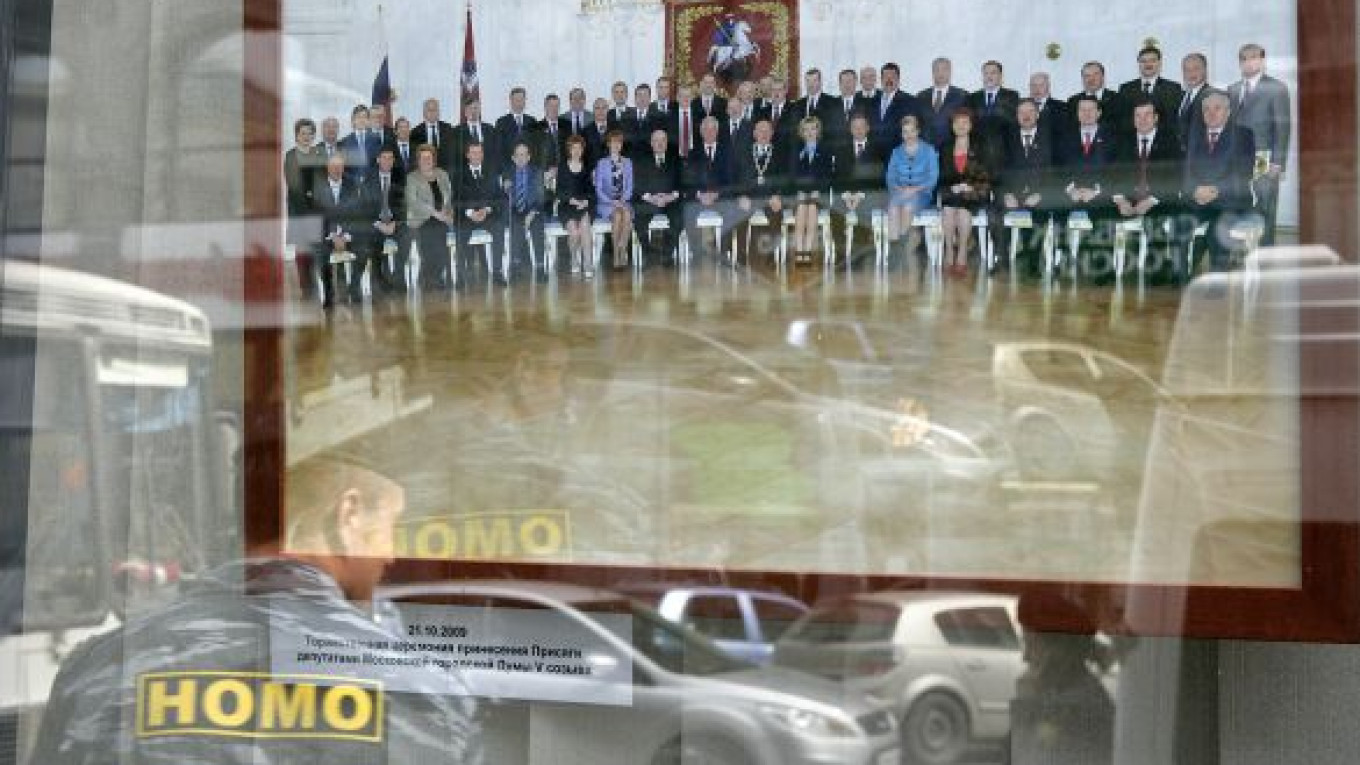The Moscow City Duma approved a 15-year plan for the city's development Wednesday despite public outcry and criticism fr om architectural specialists who said it was tailored to serve corporate interests and ignored the needs of ordinary Muscovites.
The document, known by its Soviet-era acronym Genplan, passed a third and final reading with the unanimous support of deputies fr om the United Russia party, which controls all but three seats in the 35-seat City Duma.
The Communist Party, which has the remaining seats, rejected the plan.
Opposition to the Genplan came from architects, the Public Chamber, the radical Left Front movement and members of the left-leaning Just Russia party, which staged a protest near the City Duma with activists denouncing Mayor Yury Luzhkov at the top of their lungs.
One middle-aged protester wore a T-shirt reading “Luzhmafia.ru” and carried a plastic bag that he said contained documents exposing the mayor's misdeeds. Other protesters handed out black sheets of paper, which they called “black spots” in reference to a pirate custom described in the Robert Louis Stevenson novel “Treasure Island."
Dozens of OMON riot police surrounded the City Duma building. More than 20 protesters were detained, a city police spokesman told reporters.
Vladimir Platonov, the City Duma speaker and a key ally of Luzhkov, brushed aside the criticism, saying the Public Chamber had failed to present lawmakers with any “specific amendments” to the Genplan.
About 600 amendments were submitted by various organizations in time for the final reading, and 89 of them were accepted, Mikhail Moskvin-Tarkhanov, head of the Duma's commission for city development, told RIA-Novosti. He said many of the suggestions dealt with the development of tram lines and fast-food chains.
Critics said the Genplan would destroy historic Moscow and is focused on developing commercial buildings, not green zones.
“We are losing the center of Moscow, and soon we will not be able to say wh ere our old city is,” said Marat Guelman, an art curator and member of the Public Chamber.
Guelman said Public Chamber members were challenging the plan in court because it had not been approved by the federal authorities.
A 2007 government decree requires all regions to submit their development plans to the Regional Development Ministry for approval. Moreover, Moscow is a state capital and federal city, which gives the federal authorities a say in its development.
Tarkhanov said City Hall submitted the Genplan, as well as documents concerning the regulation of the city functions as a capital, to the ministry but received no response.
Representatives of the Regional Development Ministry were unavailable for comment Wednesday.
Alexei Klimenko, an architect and member of an advisory council to Moscow's chief architect, complained that his colleagues responsible for drafting the plan were “being subservient” to Luzhkov, who he said lacks knowledge of architecture and urban development.
Sergei Mitrokhin, leader of the Yabloko opposition party and a former Duma deputy, voiced doubts that the Public Chamber had a chance of defeating City Hall in court.
“All court cases will be lost,” Mitrokhin said, adding that the critics faced a tough fight with “hungry investors” coming to “snatch up the city.”
He said the opponents managed to score a minor victory when they forced City Hall to remove new waste-burning plants within the Moscow city lim its from the Genplan.
But the protests were too small to stop the authorities from passing the plan in its current state, he said. “The majority of Muscovites have not even heard about the plan,” he said.
Guelman said city authorities scheduled Wednesday's reading during a week between two national holidays on purpose, hoping to minimize public backlash.
The bill now goes to Luzhkov for his signature.
A Message from The Moscow Times:
Dear readers,
We are facing unprecedented challenges. Russia's Prosecutor General's Office has designated The Moscow Times as an "undesirable" organization, criminalizing our work and putting our staff at risk of prosecution. This follows our earlier unjust labeling as a "foreign agent."
These actions are direct attempts to silence independent journalism in Russia. The authorities claim our work "discredits the decisions of the Russian leadership." We see things differently: we strive to provide accurate, unbiased reporting on Russia.
We, the journalists of The Moscow Times, refuse to be silenced. But to continue our work, we need your help.
Your support, no matter how small, makes a world of difference. If you can, please support us monthly starting from just $2. It's quick to set up, and every contribution makes a significant impact.
By supporting The Moscow Times, you're defending open, independent journalism in the face of repression. Thank you for standing with us.
Remind me later.


